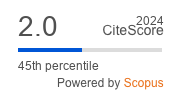Entrepreneurial tendencies among highly educated students in Germany and Italy - A cross-national study
DOI:
https://doi.org/10.23726/cij.2023.1412Keywords:
Innovation Management, Career Decisions, Germany, Italy, Entrepreneurship educationAbstract
Continuous and breakthrough industrial innovations are essential for sustainability and the success of modern economies. As the development of innovative products and technologies is often performed within start-up enterprises, the facilitation of entrepreneurial spirit is of major political interest. However, central European countries like Italy and Germany lack behind as highly educated students rather prefer more conventional career paths. In this study we surveyed Bachelor, Master and PhD students in Germany and Italy to further understand the cultural and socio-geographic effects on career decisions. Although only minor differences could be detected among the peer-group, beneficial observations were derived, identifying key-motivators and cultural necessities.
References
Ayres, RU, 1988, Technology: The wealth of nations, Technological Forecasting and Social Change 33(3): 189201.
Bergmann, H, et al., 2016, What makes student entrepreneurs? On the relevance (and irrelevance) of the university and the regional context for student start-ups, Small Business Economics 47(1): 53-76.
Blind, K, 2012, The influence of regulations on innovation: A quantitative assessment for OECD countries, Research Policy 41(2): 391-400.
Bower, JL and CM, Christensen, 1995, Disruptive Technologies: Catching the Wave, Harvard Business Review.
Campanella, F, et al., 2013, The Role of Sociocultural Background on the Characteristics and the Financing of Youth Entrepreneurship. An Exploratory Study of University Graduates in Italy, Journal of the Knowledge Economy 4(3): 244-259.
Chesbrough, HW, 2003, Open Innovation: The New Imperative for Creating and Profiting from Technology, Entrepreneurial tendencies among highly educated students in Germany and Italy - A cross-national study, Harvard Business School Press, ISBN: 978-1-57851-837-1.
Decker, R, et al., 2014, The Role of Entrepreneurship in US Job Creation and Economic Dynamism, Journal of Economic Perspectives 28(3): 3-24.
Eurostat 2018, Tertiary education statistics, Retrieved 23.09.2022, 2022, from https://ec.europa.eu/eurostat/statisticsexplained/index.php?title=Tertiary_education_statistics
Faber, MJ, 2009, Open Innovation Ansatz von Chesbrough. Open Innovation: Ansätze, Strategien und Geschäftsmodelle. M. J. Faber. Wiesbaden, Gabler: 21-44.
Fuerlinger, G, et al., 2015, The role of the state in the entrepreneurship ecosystem: insights from Germany, Triple Helix 2(1): 3.
GEM, 2021, Global Entrepreneurship Monitor - 2021/2022 Global Report, Retrieved 23.09.2022, 2022, from https://www.gemconsortium.org/file/open?fileId=50900.
GEM, 2022, Global Entrepreneurship Monitor 2021 - 2020. Retrieved 24.09.2022, 2022, from https://www.gemconsortium.org/economyprofiles/germany-2.
Israr, M and Saleem, M, 2018, Entrepreneurial intentions among university students in Italy,Journal of Global Entrepreneurship Research 8(1): 20.
Issam, H and Peter, H, 2019, Job Creation in Europe: A firmlevel analysis, European Commission, https://doi.org/10.2760/590043
Kristiansen, JN and Ritala, P, 2018, Measuring radical innovation project success: typical metrics don’t work, Journal of Business Strategy 39(4): 34-41.
Merck, 2022, Annual Report 2021.
Merck, 2023, Acquisitions & Divestments, from https://www.merckgroup.com/en/investors/whyinvest/acquisitions.html.
Miller, J, et al., 2021, Projekt Lightspeed: Der Weg zum BioNTech-Impfstoff - und zu einer Medizin von morgen, Rowohlt E-Book, ISBN: 978-3-498-00277-0.
Nunes, P and Breene, T, 2011, Reinvent Your Business Before It’s Too Late, Harvard Business Review.
Strobel, N and Kratzer, J, 2017, Obstacles to innovation for SMEs: evidence from Germany, International Journal of Innovation Management 21(03): 1750030.
Weiblen, T and Chesbrough, HW, 2015, Engaging with Startups to Enhance Corporate Innovation, California Management Review 57(2): 66-90.
Downloads
Published
How to Cite
Issue
Section
Categories
License
Copyright (c) 2023 Florian Tschernuth, Xin Shen, Alessandro Rossi, Alice Antonelli, Hippolyte Goutebroze

This work is licensed under a Creative Commons Attribution 4.0 International License.
Authors who publish with this journal agree to the following terms:
- Authors retain copyright and grant the journal right of first publication with the work simultaneously licensed under a Creative Commons Attribution License that allows others to share the work with an acknowledgement of the work's authorship and initial publication in this journal.
- Authors are able to enter into separate, additional contractual arrangements for the non-exclusive distribution of the journal's published version of the work (e.g., post it to an institutional repository or publish it in a book), with an acknowledgement of its initial publication in this journal.
- Authors are permitted and encouraged to post their work online (e.g., in institutional repositories or on their website) prior to and during the submission process, as it can lead to productive exchanges, as well as earlier and greater citation of published work (See The Effect of Open Access).


